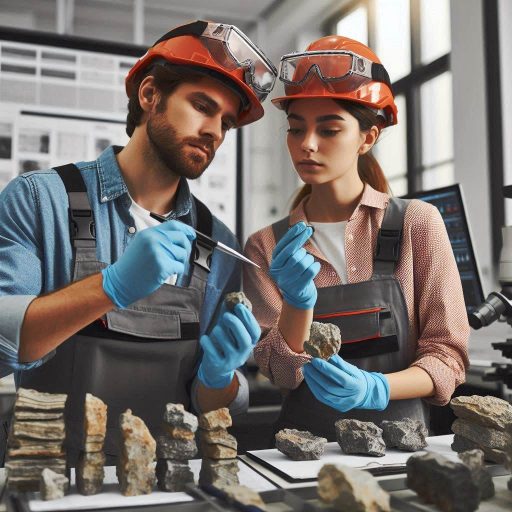Introduction
Geological technicians play a crucial role in the field of geology.
They assist geologists by gathering and analyzing data from the field.
Their work includes sampling rock, soil, and water.
They also use specialized equipment to conduct tests and surveys.
This data helps in understanding the earth‘s processes and resources.
Geological technicians are essential for several reasons.
They ensure that the data collected is accurate and reliable.
This data supports crucial decisions about resource extraction and environmental protection.
They often work in challenging conditions, such as remote locations or harsh weather.
Their expertise contributes to the successful completion of geological projects.
However, geological technicians face several common challenges in their roles.
They often deal with unpredictable weather, which can hinder fieldwork.
Safety risks are also prevalent, especially in hazardous environments like mining sites.
Equipment malfunctions or inaccuracies can lead to delays and incorrect data.
Additionally, technicians must stay updated with evolving technologies and methodologies in geology.
Balancing fieldwork with lab analysis can be demanding, requiring both physical and mental stamina.
Despite these challenges, their work remains vital to advancing geological knowledge and ensuring effective resource management.
Lack of formal training
Importance of Specialized Education and Training in Geology
Specialized education and training are fundamental in the field of geology.
They provide technicians with essential skills to understand geological processes and environmental impacts.
A solid educational foundation ensures proficiency in using advanced geological equipment and interpreting complex data.
Specialized courses offer knowledge in areas like mineralogy, petrology, and geophysics, which are crucial for accurate assessments.
Proper training prepares technicians to tackle fieldwork challenges and analyze geological samples effectively.
This education directly influences their ability to conduct research and make informed decisions.
Impact of Lack of Formal Training on Job Performance
The absence of formal training in geology can severely affect job performance.
Technicians without proper education may struggle with interpreting geological maps and data correctly.
This can lead to incorrect conclusions about mineral deposits or geological formations.
Inaccurate analysis can result in costly errors and inefficiencies, impacting project outcomes.
Additionally, untrained technicians may find it difficult to operate specialized geological equipment, which can further compromise data quality.
The lack of formal education may also limit career advancement opportunities, as employers often seek candidates with specialized knowledge and skills.
Ways to Overcome This Challenge Through Continuous Learning and Professional Development Opportunities
To overcome the challenges posed by a lack of formal training, continuous learning and professional development are essential.
Enrolling in specialized courses can help technicians stay updated with the latest advancements in geology.
Online platforms, such as Coursera and Udemy, offer courses on advanced geological techniques and technologies.
Attending workshops and conferences provides practical experience and exposes technicians to new methodologies.
Networking with industry professionals at these events can also lead to valuable insights and opportunities.
Certifications from recognized institutions can enhance a technician‘s qualifications and professional standing.
These certifications often require passing exams and completing ongoing education credits, ensuring that professionals remain current with industry standards.
Pursuing certifications in areas like environmental geology or mineral exploration can open doors to new career opportunities and demonstrate expertise.
Read: Surveying and Mapping Technician Internships: A Guide
Limited field experience
One of the common challenges that geological technicians face is limited field experience.
This lack of hands-on experience can be a hindrance in their job performance and career growth.
In this section, we will discuss the importance of gaining field experience, the challenges involved, and strategies to overcome them.
Importance of hands-on experience in geological technician jobs
Field experience is crucial for geological technicians as it allows them to apply theoretical knowledge in real-world scenarios.
It helps in developing practical skills, gaining exposure to different geological settings, and understanding the challenges encountered in the field.
This experience can also enhance problem-solving abilities and decision-making skills, which are essential in the field of geology.
Challenges faced in gaining field experience
One of the main challenges faced by geological technicians in gaining field experience is the limited opportunities available.
Many entry-level positions require candidates to already have some level of field experience, making it difficult for newcomers to break into the industry.
Additionally, fieldwork can be physically demanding and often takes place in remote locations, posing logistical challenges for technicians.
Strategies to gain field experience
Despite the challenges, there are several strategies that geological technicians can use to gain valuable field experience.
One common approach is to seek out internships or volunteer opportunities with geological organizations, research institutions, or government agencies.
These programs provide hands-on training in field techniques, data collection, and analysis under the guidance of experienced professionals.
Networking with industry professionals and joining geological field trips or workshops can also help technicians expand their field experience and build a strong professional network.
In general, field experience is essential for geological technicians to excel in their roles and advance their careers.
By recognizing the importance of hands-on experience, understanding the challenges involved, and implementing strategies to gain field experience, technicians can overcome obstacles and enhance their skills in the field of geology.
Read: How to Become a CAD Technician: Step-by-Step Guide
Inadequate equipment and resources
Impact of Outdated or Insufficient Equipment on Job Tasks
Outdated or insufficient equipment can severely impact job tasks for geological technicians.
Old tools and instruments may not provide accurate measurements, leading to unreliable data.
This can compromise the quality of geological surveys and assessments.
Moreover, technicians may face difficulties in performing essential tasks, such as soil sampling and rock analysis, if the equipment is not up to date.
Insufficient equipment can also slow down project progress and increase the likelihood of errors.
Technicians might have to perform repetitive tasks to ensure accuracy, which can be both time-consuming and frustrating.
The lack of modern technology can hinder the ability to analyze complex geological data and solve problems efficiently.
ogical data and solve problems efficiently.
Challenges in Accessing Resources Needed for Geological Technician Work
Accessing necessary resources is another challenge for geological technicians.
Limited availability of specialized tools, software, or reference materials can impede their ability to perform effectively.
In some cases, technicians might face budget constraints that restrict access to essential equipment or educational resources.
Additionally, geographic location can impact resource availability.
Technicians working in remote areas may struggle to obtain the necessary supplies or support needed for their tasks.
This lack of access can result in delays, inaccuracies, and reduced overall productivity.
Solutions to Address This Challenge Through Communication with Supervisors and Seeking Alternative Resources
To overcome challenges related to outdated equipment and resource access, effective communication with supervisors is crucial.
Technicians should discuss their equipment needs and resource constraints openly.
Supervisors can then advocate for upgrades or additional resources that are essential for successful job performance.
Seeking alternative resources is another effective strategy.
Technicians can explore options such as renting or borrowing equipment when purchasing new tools is not feasible.
Online resources and digital libraries can also provide valuable information and tools that might be otherwise inaccessible.
Professional organizations and industry networks can offer resources and support.
These groups often provide access to updated tools, software, and training materials.
Joining such organizations can also help technicians stay informed about technological advancements and best practices in the field.
Read: Top CAD Software for Aspiring CAD Technicians

Communication barriers with geologists
Importance of Effective Communication Between Geological Technicians and Geologists
Effective communication between geological technicians and geologists is essential.
Technicians must clearly convey field observations and data to geologists.
Geologists rely on this information to make informed decisions about exploration and analysis.
Clear communication helps prevent misunderstandings and errors in data interpretation.
Challenges in Conveying Information or Understanding Instructions
One challenge is ensuring that field data is accurately reported.
Miscommunication can lead to errors in data collection and analysis.
Technicians may also struggle with understanding complex instructions from geologists.
This can result in incomplete or inaccurate data, impacting the overall project.
Another challenge is the technical jargon used in geology.
Geologists may use specialized terms that are unfamiliar to technicians.
This can create confusion and hinder effective communication.
Technicians need to understand these terms to accurately follow instructions and report findings.
Ways to Improve Communication Skills and Foster Positive Working Relationships with Geologists
To improve communication skills, focus on active listening.
Pay close attention to instructions and ask clarifying questions if needed.
This ensures that you fully understand the tasks and expectations.
Practicing clear and concise reporting of data also helps in effective communication.
Build positive working relationships by showing professionalism and respect.
Approach interactions with geologists with a collaborative mindset.
Offer feedback constructively and be open to receiving it.
Developing a strong working rapport fosters a better team environment and enhances project outcomes.
Participate in communication training workshops if available.
These can offer valuable techniques for effective interaction and teamwork.
Engaging in regular team meetings can also improve communication.
Read: CAD Technician Salary: What to Expect in the USA
Dealing with environmental hazards
Risks Associated with Working in Hazardous Geological Environments
Working in hazardous geological environments presents numerous risks.
These include exposure to toxic substances, unstable ground conditions, and extreme weather.
Inadequate training increases the risk of accidents and health issues.
Specialized education helps geologists recognize these hazards and implement appropriate safety measures.
This training also prepares them to use protective equipment and respond effectively to emergencies.
Challenges in Ensuring Safety While Performing Job Duties
Ensuring safety in geological work is challenging.
Fieldwork often involves rugged terrain and unpredictable conditions.
Technicians may face difficulties in assessing and managing risks without proper training.
This lack of preparation can lead to injuries, equipment damage, or even fatalities.
Training programs focus on safety protocols, risk assessment, and emergency response, crucial for maintaining a safe working environment.
Transform Your Career Today
Unlock a personalized career strategy that drives real results. Get tailored advice and a roadmap designed just for you.
Start NowImportance of Following Safety Protocols and Seeking Proper Training for Handling Environmental Hazards
Following safety protocols is essential for preventing accidents and protecting health.
Specialized education teaches geologists to adhere to safety guidelines and industry standards.
Proper training includes learning how to handle environmental hazards, such as chemical spills or hazardous materials.
This knowledge helps prevent contamination and ensures compliance with environmental regulations.
To address the challenges of inadequate training, continuous learning and professional development are essential.
Enrolling in specialized courses can help technicians stay updated with the latest techniques and technologies.
Many online platforms offer geology courses that cover advanced topics and practical applications.
Attending workshops and conferences can also provide valuable hands-on experience and networking opportunities.
Certifications from recognized institutions can enhance a geologist’s qualifications and credibility.
They demonstrate a commitment to professional growth and expertise in specific areas of geology.
These certifications often require passing exams and completing continuing education credits, ensuring that professionals remain current with industry standards.
Find Out More: Top Online Courses for Data Science Beginners
Repetitive tasks and monotony
One of the common challenges that geological technicians face in their jobs is the issue of repetitive tasks and monotony.
This can have a significant impact on job satisfaction and motivation, as well as present obstacles to finding fulfillment in routine job responsibilities.
In order to combat these challenges, there are several strategies that technicians can employ to overcome monotony and inject a sense of excitement and variety into their work.
Impact of Repetitive Tasks on Job Satisfaction and Motivation
Repetitive tasks can lead to a decrease in job satisfaction and motivation among geological technicians.
Performing the same tasks over and over again can become boring and mundane, causing employees to lose interest and enthusiasm for their work.
This can ultimately result in a decline in overall job satisfaction and a lack of motivation to perform at their best.
Challenges in Finding Fulfillment in Routine Job Responsibilities
Another challenge that geological technicians face is the difficulty of finding fulfillment in routine job responsibilities.
When tasks become monotonous and repetitive, technicians may struggle to feel a sense of accomplishment or purpose in their work.
This can lead to feelings of dissatisfaction and a lack of fulfillment in their roles.
Strategies to Overcome Monotony
- Seeking New Projects: One way to overcome monotony in geological technician jobs is to seek out new projects or assignments.
By taking on new challenges and working on different tasks, technicians can break up the monotony of their daily routines and find renewed excitement in their work. - Taking on Additional Responsibilities: Another strategy to combat monotony is to take on additional responsibilities within the workplace.
This can include volunteering for special projects, helping out with tasks outside of their usual scope of work, or pursuing professional development opportunities.
By expanding their role and taking on new challenges, technicians can keep their work fresh and engaging. - Job Rotation: Implementing a job rotation program can also help alleviate monotony for geological technicians.
By rotating technicians through different roles or departments, organizations can provide variety in their work assignments and help employees avoid getting stuck in a rut of repetitive tasks.
This can help maintain job satisfaction and motivation among technicians. - Investing in Training and Development: Providing opportunities for training and development can also help combat monotony in technician jobs.
By offering employees the chance to learn new skills, expand their knowledge, and take on new challenges, organizations can keep their workforce engaged and motivated.
This can help technicians stay energized and interested in their work, even when faced with repetitive tasks.
Overall, while repetitive tasks and monotony can pose challenges for geological technicians, there are strategies that can be employed to overcome these obstacles and keep employees engaged and satisfied in their roles.
By seeking out new projects, taking on additional responsibilities, implementing job rotation programs, and investing in training and development, technicians can break up the monotony of their daily routines and find fulfillment in their work.
Limited career advancement opportunities
One of the common challenges in geological technician jobs is limited career advancement opportunities.
This can be frustrating for individuals looking to grow and progress in their careers within this field.
Challenges in Career Growth and Progression
Geological technicians may find it challenging to move up the career ladder due to the limited opportunities available.
This can lead to feelings of stagnation and dissatisfaction in their roles.
Importance of Setting Long-Term Career Goals Seeking Professional Development Opportunities
To overcome this challenge, it is crucial for geological technicians to set long-term career goals.
By having a clear direction in mind, they can work towards achieving their professional aspirations.
Another important aspect is seeking out professional development opportunities.
This can include attending workshops, seminars, or pursuing advanced certifications that can enhance their skills and knowledge.
Strategies to Advance in the Field
Geological technicians can also explore various strategies to advance in the field.
One effective way is to pursue additional certifications related to their specialization, which can make them stand out to potential employers.
Furthermore, further education such as obtaining a master’s degree in geology or a related field can open up new career opportunities and increase their chances of career advancement.
Networking with professionals in the industry, attending conferences, and staying updated on the latest advancements in geology can also help geological technicians stay competitive in the job market.
By actively seeking out opportunities for growth and development, geological technicians can overcome the challenge of limited career advancement and work towards achieving their career goals in the field of geology.
Learn More: Day in the Life of a Drafter: What to Expect
See Related Content: Petroleum Engineering: Onshore vs. Offshore
Conclusion
Geological technicians face several challenges in their roles.
They often work in harsh environments, dealing with extreme weather conditions.
Precision is crucial, yet errors in data collection can lead to significant setbacks.
Technicians must also handle complex equipment and software, requiring constant skill updates.
Safety is a constant concern, given the hazardous nature of many field sites.
Addressing these challenges is vital for thriving in the profession.
Proper training and adherence to safety protocols can minimize risks.
Regular updates to technical skills ensure accuracy in data collection and analysis.
Technicians should seek mentorship and continuously improve their problem-solving abilities.
Being adaptable and resilient helps in managing unexpected issues effectively.
Aspiring geological technicians should view these challenges as opportunities for growth.
Embrace the learning curve and seek solutions proactively.
Overcoming obstacles will build resilience and expertise.
Remember, each challenge faced is a step toward becoming a skilled professional.
Stay committed, continuously improve, and success will follow.
By addressing these common issues head-on, you can excel in your career as a geological technician.
Embrace the learning journey and stay determined.
With persistence and adaptability, you will overcome these challenges and achieve success in the field.




